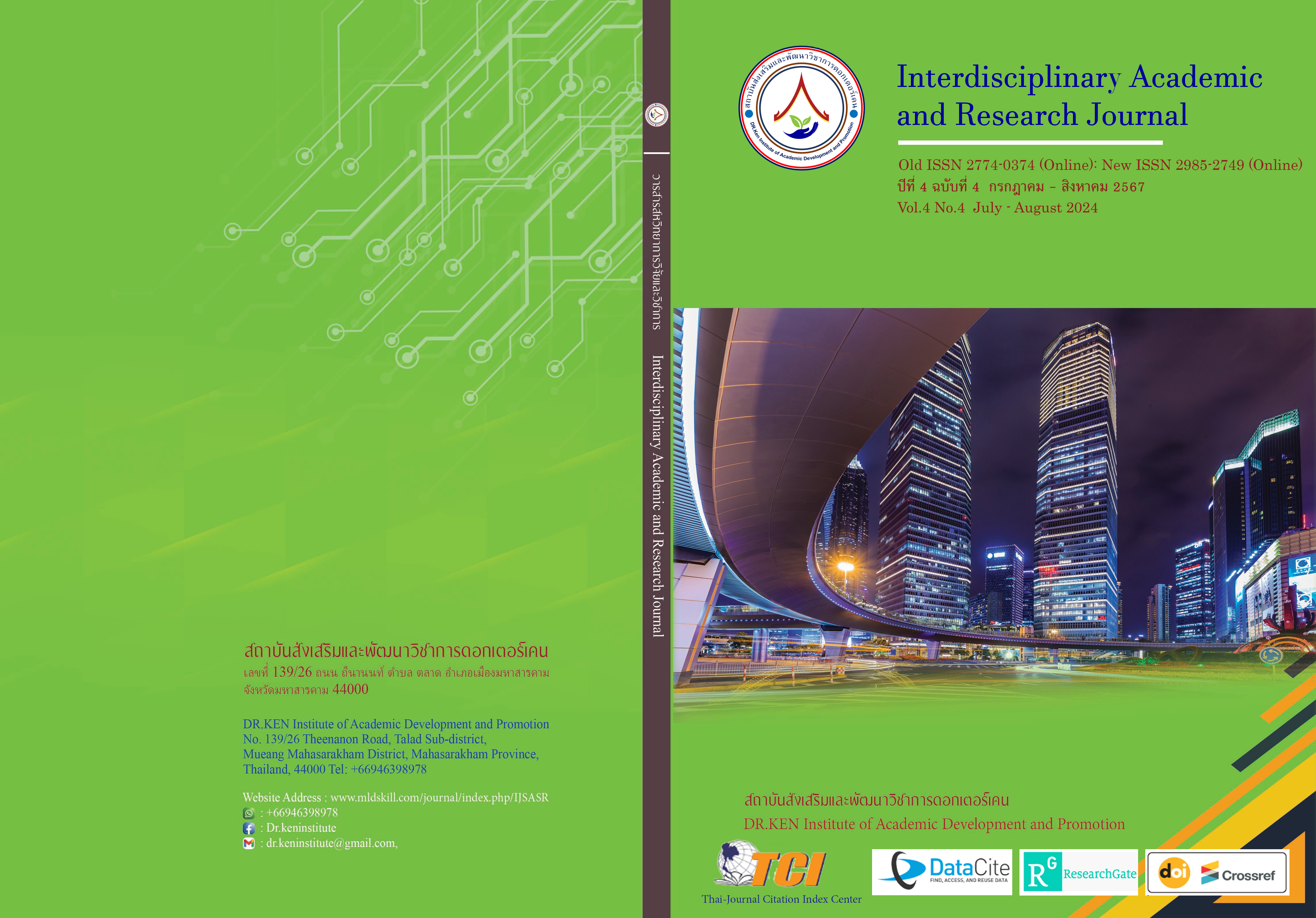Innovative Leadership that Affects the Effectiveness of Subdistrict Administrative Organizations in Narathiwat Province
DOI:
https://doi.org/10.60027/iarj.2024.277373Keywords:
Innovative Leadership; , Skills; , Personality;, Society; , Roles; , Organizational Effectiveness;, Subdistrict Administrative Organization;, NarathiwatAbstract
Background and Aims: Studying innovative leadership that affects effectiveness in subdistrict administrative organizations in Narathiwat Province is therefore very interesting and necessary for creating organizational change, creating social and creating change in the organization's innovative leaders and followers in the local government sector and People who have a stake The objectives of this research are 1) to study innovative leadership in skills that affect the organizational effectiveness of the subdistrict administrative organization in Narathiwat Province. 2) to study innovative leadership in the personality that affects the organizational effectiveness of the administrative organization. Sub-district administrative organizations in Narathiwat province. 3) To study innovative leadership in social aspects that affect the organizational effectiveness of the sub-district administrative organizations in Narathiwat province. 4) To study innovative leadership in roles and responsibilities that affect the organizational effectiveness of the sub-district administrative organizations in Narathiwat province. Subdistrict in Narathiwat Province.
Methodology: The sample group used is Civil servant personnel government employees and regular employees under the Subdistrict Administrative Organization of Narathiwat Province, 72 locations, totaling 400 people.
Results: The results of the study found that Variables that have a positive relationship with the organizational effectiveness of the Subdistrict Administrative Organization in Narathiwat Province overall with statistical significance at the .01 level include skills, personality, social and role and duty with coefficients equal to 0.910, 1.873, 0.761, and 0.907 respectively, which means that the skills, personality, social, and role and duty are the factors that determine overall organizational effectiveness of the Subdistrict Administrative Organization in Narathiwat Province.
Conclusion: At a statistically significant level of 0.01 the study essentially concludes that skills, personality traits, social interactions, and carrying out role responsibilities are important factors in improving the organizational effectiveness of the Subdistrict Administrative Organization in Narathiwat Province.
References
กัลยา วานิชย์บัญชา (2561). การใช้ SPSS for Windows ในการวิเคราะห์ข้อมูล. กรุงเทพฯ : สามลดา
กุลชลี จงเจริญ. (2562). แนวทางการพัฒนาภาวะผู้นำเชิงสร้างสรรค์ของผู้บริหารสถานศึกษาขั้นพื้นฐานในเขตกรุงเทพมหานครและปริมณฑล. วารสารศึกษาศาสตร์ มสธ, 12(1), 189 - 210.
ชาญ รัตนะพิสิฐ.(2551) ปัจจัยที่ส่งผลต่อประสิทธิผลขององค์การของผู้ประกอบการวิสาหกิจขนาดกลางและขนาดย่อมในเขตกรุงเทพมหานครและปริมณฑล. วิทยานิพนธ์วิทยาศาสตรมหาบัณฑิต (จิตวิทยาอุตสาหกรรม) มหาวิทยาลัยเกษตรศาสตร์.กรุงเทพมหานคร.
ปิยวรรณ รามศิริ ทัศนา แสวงศักดิ์ และ สมชาย เทพแสง. (2561). การพัฒนารูปแบบภาวะผู้นำเชิงสร้างสรรค์ของผู้บริหารสถานศึกษา สังกัดองค์กรปกครองส่วนท้องถิ่น. วารสารบริหารการศึกษา มศว. 15 (28), 12-25.
พิมพ์ใจ โอภานุรักษ์ธรรม. (2542). มนุษยสัมพันธ์ของผู้บริหาร. กรุงเทพฯ : คณะครุศาสตร์ สถาบันราชภัฏสวนสุนันทา
ภรณี กีรติบุตร (2529). การประเมินประสิทธิภาพขององค์กร. กรุงเทพฯ: โอเดียนสโตร์
ภิรญา สายศิริสุข. (2561). ภาวะผู้นำเชิงนวัตกรรมของผู้บริหารในโรงเรียนมัธยมศึกษากลุ่มสหวิทยาเขตปัญจภาคีสังกัดสำนักงานเขตพื้นที่การศึกษามัธยมศึกษาเขต 4. การศึกษาค้นคว้าอิสระศึกษาศาสตรบัณฑิต: มหาวิทยาลัยเกษตรศาสตร์.
สุรกิจ สุวรรณแกม. (2561). ภาวะผู้นําเชิงนวัตกรรมของผู้บริหารองค์กรปกครองส่วนท้องถิ่นในอําเภอภาชี จังหวัดพระนครศรีอยุธยา. วิทยานิพนธ์ปริญญามหาบัณฑิต: มหาวิทยาลัยจุฬาลงกรณราชวิทยาลัย.
อนุสรา สุวรรณวงศ์. (2559). ภาวะผู้นําเชิงนวัตกรรม (Innovative Leadership). Retrieved from: https://www.trueplookpanya.com/education/content/52233
อรอนงค์ โรจน์วัฒนบูลย์. (2554). การพัฒนาตัวแบบผู้นำเชิงนวัตกรรม. วิทยานิพนธ์ปริญญาดุษฎีบัณฑิต: สถาบันบัณฑิตพัฒนบริหารศาสตร์.
Campbell, R.F., et al. (1977). “ On the Nature of Organizational Effectiveness” in New purposetives on Organizational Effectiveness. Edited by Paul S. Goodman and Johannes M. Pennings and Associates. San Francisco : Jassay Bass
Emerson, R. M. (1976). Social exchange theory. Annual Review of Sociology, 2, 335–362. https://doi.org/10.1146/annurev.so.02.080176.002003
Gouldner, A.W. (1960) The Norm of Reciprocity: A Preliminary Statement. American Sociological Review, 25, 161-178. https://doi.org/10.2307/2092623
Gross, E., & Etzioni, A. (1985). Organizations in society. Englewood Cliffs. New Jersey Prentice-Hall.
House, R. J. (1971). A Path-Goal Theory of Leader Effectiveness. Administrative Science Quarterly, 16, 321-339.https://doi.org/10.2307/2391905
Jones, S. (2002). The Internet Goes to College: How Students Are Living in the Future with Today’s Technology. Pew Internet & American Life Project. http://files.eric.ed.gov/fulltext/ED472669.pdf
Krejcie, R.V., & Morgan, D.W. (1970). Determining sample size for research activities. Educational and Psychological Measurement, 30(3), 607-610.
Quinn, R., & Rohrbaugh, J. (1983) A Spatial Model of Effectiveness Criteria: Toward a Competing Values Approach to Organizational Analysis. Management Science, 29, 363-377. http://dx.doi.org/10.1287/mnsc.29.3.363
Srisuk, T., & U-senyang, S. (2022). The Relationship Between Innovative Leadership and Innovative Organization of Local Government Organizations in the Southern Border Provinces. Interdisciplinary Academic and Research Journal, 2(2), 1–14. https://doi.org/10.14456/iarj.2022.9.
Tidd, J., & Bessant, J. (2014). Strategic Innovation Management. Chichester: John Wiley
Weiss, S.D., & Legand, P.C. (2011). Innovative intelligence. John Wiley & Sons.
Downloads
Published
How to Cite
Issue
Section
License
Copyright (c) 2024 Interdisciplinary Academic and Research Journal

This work is licensed under a Creative Commons Attribution-NonCommercial-NoDerivatives 4.0 International License.
Copyright on any article in the Interdisciplinary Academic and Research Journal is retained by the author(s) under the under the Creative Commons Attribution-NonCommercial-NoDerivatives 4.0 International License. Permission to use text, content, images, etc. of publication. Any user to read, download, copy, distribute, print, search, or link to the full texts of articles, crawl them for indexing, pass them as data to software, or use them for any other lawful purpose. But do not use it for commercial use or with the intent to benefit any business.
















.png)


